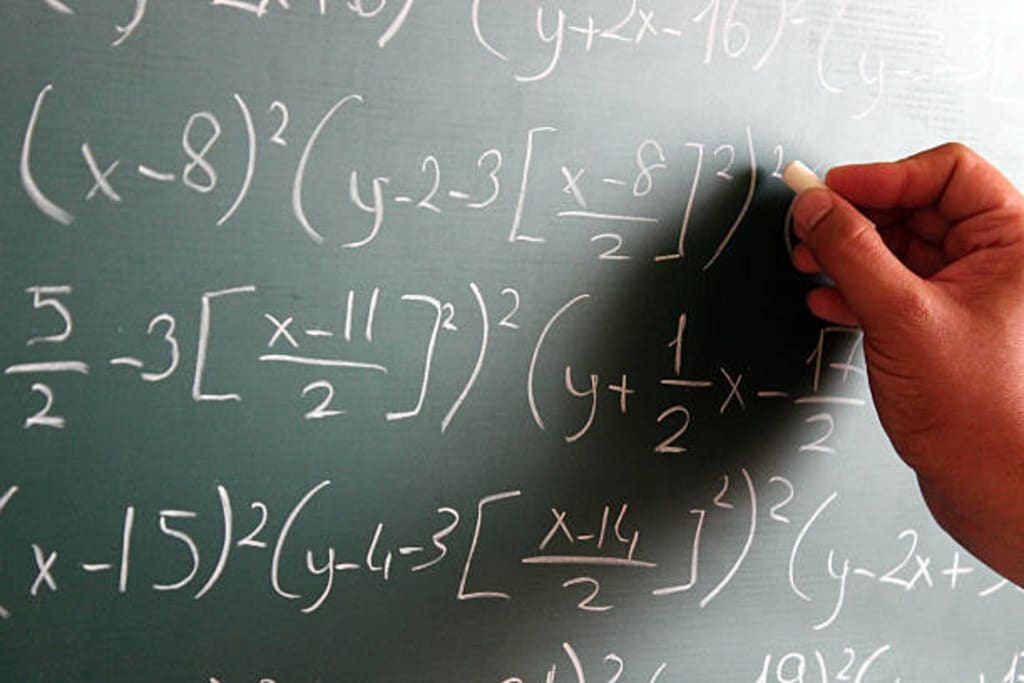How College Changed My Perspective on Math
I thought I knew it all.

I'm an education major. This means that I have to go back and relearn nearly 12 years of schooling, but this time from another perspective.
I was a little hesitant to take my math class my first year. It was one class that was split into two parts, with one part a semester. I was good at math, but I was never the strongest at it, and I was afraid that college math would be at least 50 times harder than what I experienced during my regular school years.
It wasn't.
I walked into the classroom to meet my bright-eyed professor, who welcomed me with open arms and was already practicing everyone's names. He placed us sitting in different groups, where I was able to meet three other education majors who were scared of math just like me.
He started out by handing us all a pencil because he knew a lot of us would ultimately forget. However, it was what he had inscribed on the pencil that got my mind reeling.
"Math is not a spectator sport."
My professor began to explain to the class what this math class really was. We had to relearn all of math, starting with regular addition, subtraction, multiplication, and division, and then next semester, we'll continue with fractions and probability. This put me into shock. I had to relearn addition and subtraction? That was a kindergarten skill that I had already mastered many eons ago.
I thought I knew it all. I was wrong.
My professor told us not to get textbooks. He explained to us that the textbooks aren't exactly made by any real math teachers, just by people who wanted to make money and make it easy so they consulted with real math teachers on occasion. So, he made his own textbook and made it available to us in a PDF form. He explained to us he is never going to assign too much homework because assigning book problems that don't give us an answer and show us how to solve the problem are useless because we will never learn that way.
As soon as he was done explaining, he put addition problems on the board. Simple addition problems, but this started the epiphany of why math isn't as scary as it looks.
The problems were easy, 2+2, 5+5, 20+10, and when he asked us to explain our answer, we just simply said that "we knew it," There was no explanation.
That's the problem. We are never forced to explain. We are robots to the common knowledge, but we don't know why or how we got the answers to the problems.
Now for the big guns, 367+83. Everyone was amused by what we thought was humor. So, we grabbed our papers, carried and borrowed with confidence, and all came up with the same answer. When we were asked why, it was just because "we were taught that way." We had absolutely no knowledge of why we did math the way we did math.
This is when he explained the pinnacle of what math truly is:
We are forced in our classes nowadays to memorize formulas, patterns, ways of solving problems the quickest. We are never taught to look at the problem, become problem solvers, and think of our own way to solve it. We knew what we were taught, and we were always prevented from trying our own ways of solving problems. He asked how many of us were told by our teachers "not to use your way," or "don't use your parents way, just stick to this" even though we were getting the right answers. We were forced to copy the work of our teachers, and expected to get the right answers. All of us raised our hands. He told us he is going to guide us through this class, but he is not going to teach it, we are. We are going to explain our thinking of answers to the class, share our own ways of solving the problem so others can try, and most importantly: scrap all formulas and shortcuts because they will never show you what math truly is. No more carrying and borrowing, no more solving from the right to the left. He taught us so many different ways to add, subtract, multiply, and divide so we could find what works best for us. Tests told us on every question to use the method that works best for us.
Throughout the semester, he made all of us be volunteers to go up and lead the class during lessons, and as I started to feel comfortable and confident with my own work, I took strides and led the class multiple times, even within the first week of school. He told us that if we are going to be teachers, we have to get up in front of the class and explain something that is our biggest fear to our peers first. If the class had a dispute on a question, each student would explain their thinking out loud to my professor, each other, and the class, while explaining their thinking on the whiteboard. We all felt confident.
But why? Why did we feel confident? The answer is simple: We were allowed to let our brains work out and process problems in a way that we could figure out. We weren't force-fed information that we had to mimic, but instead, we were given full range to expand our minds and understand what we were learning. He never told us we were wrong and belittled us like we had experienced for so many years, he only told us to keep on thinking and figure out why the problem isn't coming out the way most of the classes' answers had.
Each class he would have a video or a study for us to look at, and most showed school-age children and how they learned math. They showed real-life classrooms during math classes, and how better the children reacted to the problems by being able to think for themselves and problem solve on their own (guided and facilitated by teachers). What I didn't realize was he was just showing us exactly what was happening to us.
My professor had us do a project, where we set math goals for ourselves in the beginning of the semester, and by the end of the semester we had to write if we met those goals and provide evidence of work we did to show it.
I wrote: My math goal is that I will solve math the way that I believe it should be solved. Instead of solving it the systematic way that we've always been taught, I want to be able to find my own way to solve math problems and stray away from traditional methods because it really holds my thinking back.
By the end of the semester, I wrote (paraphrased): At the beginning of this course, when I was asked about my ability about problem-solving and being a problem solver, I admitted that I wasn’t that good of a problem solver. I could tell you how to solve the problems, simply because I had learned the different formulas on how to solve them. I could give you the process and steps of each of the formulas and equations that I learned, but when it came to really understanding the problem, understanding what I was doing and how I was solving the problem, and thinking of different ways that I could solve the problem, I couldn’t do it. I never understood how badly knowing just the formulas and equations really messed up my problem-solving skills.
Throughout this course, I’ve improved as a problem solver. I was asked questions that posed my thinking, that made me truly think about what the problem was that I was solving, and how I could better understand it. I’ve done more in this past semester in terms of problem-solving and understanding the problem than I have in my entire public school math career. I was never good at counting and probability. This semester really opened up my eyes to see what the true meaning of math definitions are and understand what they truly mean. When we learned about polygons, I could tell you what a polygon was, and give the proper formulas and equations on how to solve for area and volume, but I never understood that there were easier ways to find each of those things. I’ve learned about various ways to split apart a shape, from side to side, vertex to vertex, or side to vertex. I’ve learned of different ways that I can solve for volume and area, rather than relying on my prior knowledge of formulas and equations that only took me part of the way in problem-solving. I learned about bigger numbers meaning that there are smaller units in the whole, and smaller numbers where there are bigger units in the whole.
Through the class, I’ve had a new dawn and resurrection of my problem-solving skills. The things that I thought I knew, I truly didn’t, and deep down inside throughout public school, I was struggling with my problem-solving skills. I was successful in my math endeavors in high school, but that was with the aid and memorization of formulas and equations. Now, after this course, I can proudly say that my problem-solving skills have improved, and I can now use proper mathematical thought to solve all of the problems that I come across in the future.
So yes, math is not a spectator sport. It requires effort, thinking, and problem-solving skills. But when you open your mind to the different possibilities that math has to offer, it is only the beginning of what you can accomplish. Not only did this class change my perspective on math as a future teacher, but it made me feel confident instead of belittled when I couldn't solve a problem, it made me feel empowered that I could solve the problems the way that I saw fit, and most importantly: this class taught me that math isn't something to be afraid of. It is only yourself that can make you afraid, but when you have the right teacher, math can be as easy as 3.14.
About the Creator
Adriana Simiriglio
Disney Obsessed | Elementary Education/History Major | Nerd For All Things | Future Teacher | Theatre Buff
Twitter: @HoneyIShrunkAge
Instagram: @agestagram






Comments
There are no comments for this story
Be the first to respond and start the conversation.